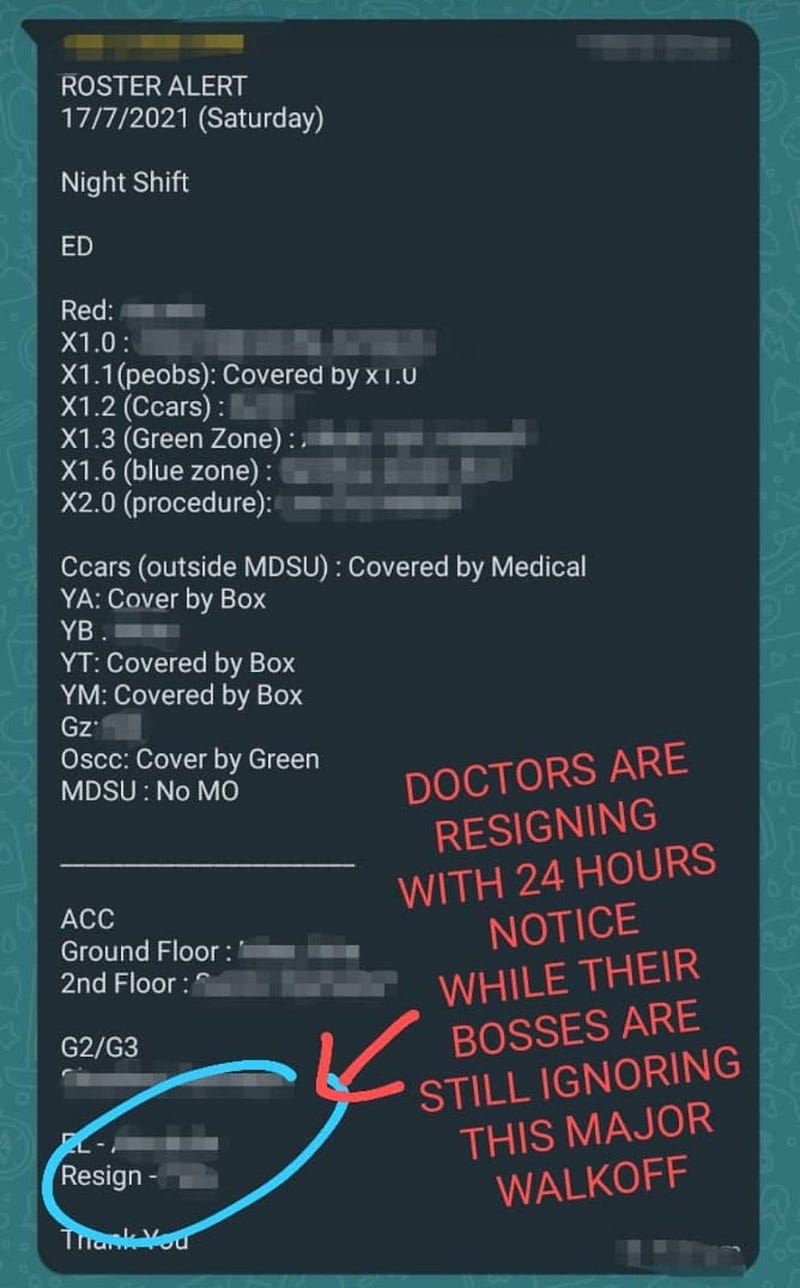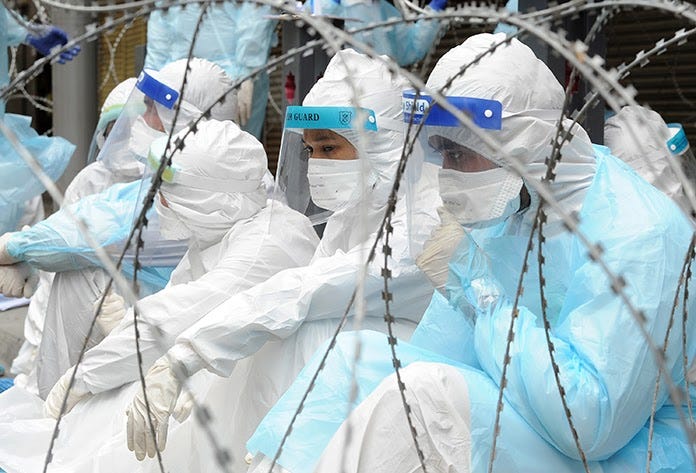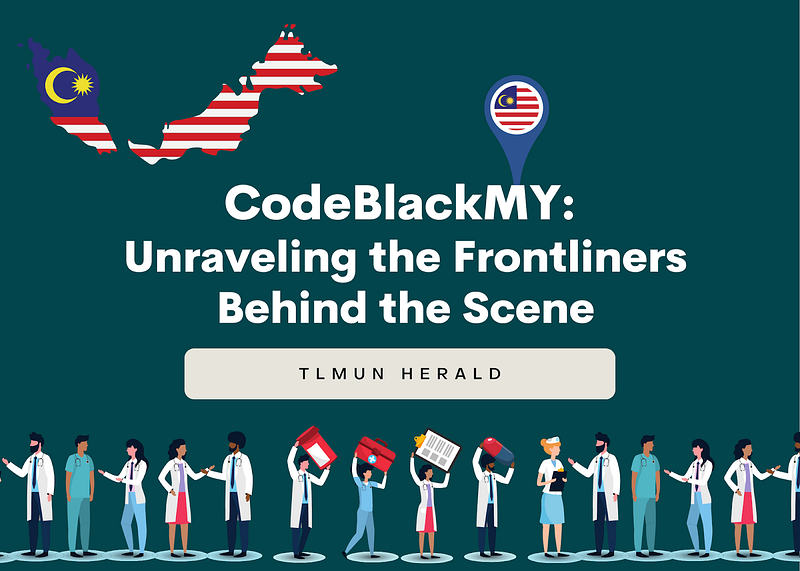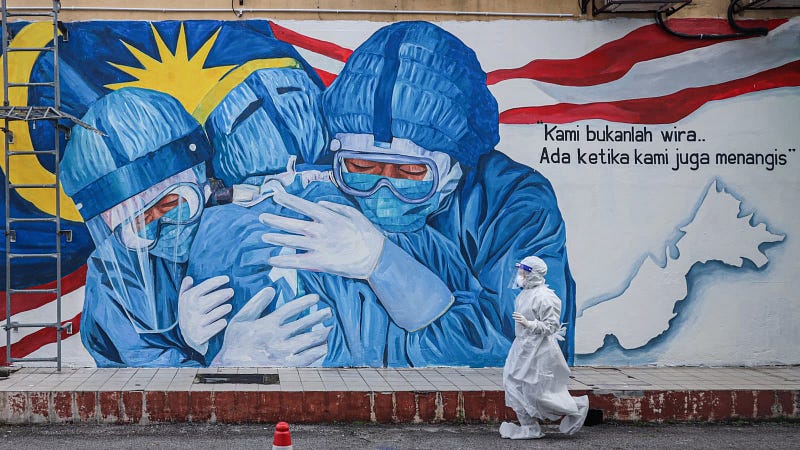CodeBlackMy: Unravelling the Front liners Behind the Scene
Disclaimer: The following article is written based on the views of the writers and does not reflect the views of the organisation.
Disclaimer: The following article is written based on the views of the writers and does not reflect the views of the organisation.
I don’t know if you’ve noticed over the past few weeks that many people have shared #CodeBlackMy, #saveMYcontractHCW, #BlackMondayMy on social media, and some have even changed their profile pictures to black and white. Let’s dive deeper into the topic.
On 26th July 2021, despite the surges of COVID-19 cases, groups of contract medical officers, government doctors in the support of #HartalDoktorKontrak from different states in Malaysia went on strike outside their respective hospitals. How and why did this happen?
What is #HartalDoktokKontrak?
The #HartalDoktorKontrak movement was led by the Malaysian Medical Association (MMA) that aims to request for:
1. Clarification on the pathways for medical postgraduates to further pursue specialisation.
2. Development of detailed and transparent criteria for screening full-time doctor positions.
3. Ensuring that the treatment of contract and full-time medical officers is equal and fair.
4. Job security for all healthcare workers.
This movement was started by a group of doctors, to stand up for themselves and request that the government provide permanent jobs for the contract health care workers. It includes not only contract doctors, but also pharmaceutical officers and dental officers seeking permanent positions in the public sector under MOH.
What is #CodeBlackMY?
Code black is a code used in hospitals, referring to a hospital emergency involving a potential risk to personnel or bomb threat.
Before 2016, all qualified doctors would be offered permanent positions, giving them the opportunity to pursue specialist courses while also securing their jobs. In an effort to reduce the glut of doctors, the Malaysian government has been hiring doctors on a contract basis since 2016. Since then, the medical graduates were temporarily hired as contract medical officers in order to avoid a permanent surge in the prevalence of medical doctors in government hospitals across the country. To pursue their further pathway as specialists, the junior medical graduates are required to complete 2 years of housemanship followed by subsequent two years of medical officer’s contracts. However, the contract system does not provide a clarification for the further continuation or extension that enables the contract medical officers for specialties or any additional training for their career advancement.
The Ministry of Health (MOH) stopped offering permanent positions to all qualified doctors. Only a few qualified doctors will be given long-term security; the rest remain on a contract basis where the contracts are renewed every two years. The MOH has the authority to terminate the contract after 18 months, which means that contract doctors’ future is full of uncertainties.
“Don’t treat contract doctors like PPEs” — Dr Dzul
Additionally, due to the contract system, these medical officers have limited opportunities compared to their counterparts with full time positions. Contract medical officers face relatively slow career development specified in the contract renewals, and are unable to move to the private sector till they have served in government hospitals for approximately five years.
The initiation and the sudden surge of the movement #HartalDoktorKontrak in this pandemic
As everyone is aware, the fourth wave of COVID-19 in our country has been rapidly spreading, and the Malaysian healthcare system is on the verge of collapsing. All of these have had a negative impact on the mental and overall well being of all health care workers. They are not only under stress at work, but they also have to live in fear of having to choose between “life and death,” which is extremely hazardous for them.
Undoubtedly, healthcare workers are the most valuable resource in the healthcare system. When Covid-19 struck our country in early 2020, all medical officers in Malaysia, whether permanent or contract doctors, were deployed to various hospitals to combat the novel pandemic. Unless the assigned doctor submits their resignation, no appeal can be heard from them, and there is no way for them to refuse or withdraw from the responsibilities.
On 19th of July, several doctors handed in a 24-hour notice of resignation. Due to exhaustion and frustration as a result of the government’s indifference to their plight, the organisation of Hartal Doktor Kontrak has also posted a screenshot on Twitter and claimed that the contract doctors decided to surrender.

The resignation notice dated July 19 was given 24 hours’ notice in advance. The reason for resignation was that as contract medical officers, they couldn’t foresee their future in the healthcare system due to all the uncertainties created by governments. Some contract medical officers who handed in the notices also indicated that they wanted to seek employment in the private sectors and pursue further education.
If it wasn’t the pandemic outbreak, will the issue of #HartalDoktorKontrak still be taken seriously?
Malaysia currently has 23,000 medical officers, including housemen, in training. They hope that by participating in this movement, they will be able to influence policy changes that will lead to a more secure and prosperous future. Not only is their future uncertain due to a lack of transparent selection criteria and a lack of workplace support, there is also a significant wage and benefit disparity between contract and permanent doctors. While contract doctors and permanent doctors have the same responsibilities and workloads, contract doctors do not receive a salary commensurate with their job scope. Furthermore, contract doctors are not eligible for labour benefits such as study leave or government loan schemes. Contract medical officers who are not given fair treatment are facing not only their confusion about the future, but also physical and psychological health problems.
Not only has the oversupply of medical graduates led to insufficient training placements at government hospitals, but the regulations governing their medical placements also play a role. Medical graduates have to wait up to a year to obtain a housemanship placement at a government hospital, and even with an oversupply of medical graduates, junior doctors are extremely overworked and underpaid. If this problem is not resolved immediately, it will have a domino effect on Malaysia’s healthcare system.

How will #CodeBlackMY impacts the country’s future healthcare system?
Instead of focusing on contract medical officers’ career advancement, the service-oriented nature and short duration of the contract system have resulted in no opportunity for medical officers to pursue specialist training. As a matter of fact, the junior medical officers are the future of our healthcare ecosystem; however, the opportunities for specialisation training are only available for full-time medical doctors. With that being said, if the training process is not consistent and continuous, there will be a shortage of specialist doctors in the coming years.
This will inevitably have a devastating effect on the country’s healthcare ecosystem in the long run.
Is there any solution for the issue of #CodeBlackMY
PM Muhyiddin Yassin announced on July 23, 2021, that the cabinet agreed to extend the service contracts of all contract medical officers, dental officers, and pharmaceutical officers for two years, and that they will be granted to study leave on full pay and scholarship endorsement on about the same basis as full-time doctors. But, is this the solution?
Yes, it might solve the issue for now, but what about the future medical graduates, and the current fresh medical graduates? Though the contract system is being used in the private sector for a long time and also has proven to improve the public healthcare system by removing incompetent medical officers and retaining the best. Nevertheless, whenever it comes to the operation and screening of qualified candidates, the Ministry of Health should be able to establish more transparent screening criteria and clearer contract renewal terms to reduce candidates’ uncertainty about their future.
The path to resolution may be complicated because it necessitates a significant shift in policy, but it is critical for not only the welfare of contract medical officers, but also for the sake of the entire country.
According to media reports in Malaysia, only about 700 of the 23000 graduates have been hired as full-time staff in government hospitals. Only 3.3% of contract doctors have obtained permanent positions as of 2020. However, as the number of medical graduates increases year after year, so does competition for jobs; thus, the contract doctor system appears to be a poor solution for the issues of crowded applicants.
Since the extension of service contracts for current contract medical officers doesn’t really help much on resolving the issue of #CodeBlackMy, what other steps could be taken by governments for it?
Contract medical officers’ job scope and duties should be redefined. It is beneficial that they have early exposure to their future career, but it may be extremely unfair for them to have similar workloads while receiving less welfare than full-time medical officers.
Greater collaboration between the Ministry of Health (MOH) and medical schools, transparency of the selection criteria for full-time positions are required to bridge the supply and demand for medical officers.
Due to a severe shortage of medical doctors in Malaysia in the 1990s, the number of medical schools in Malaysia blew up, resulting in a glut of medical graduates.
3. Aside from simply ceasing to issue new medical school licences (as it does now), the policy makers should also review the annual capacity of new admissions to existing medical schools. This may take a long time, but it will undoubtedly solve the problem at its root.
Perhaps the problem with contract doctors stems not only from an excess of medical graduates, but also from the massive expenditure of government funds, which makes it impossible to accommodate these contract doctors.
4. Quality is always more desirable than quantity. The current policy makers reintegrate and redefine the cabinet by expelling incompetent civil servants in order to make more room for medical officers who are critical to the national health system.
5. Develop more training programs for private hospitals. Since the private sectors will also be involved in the career development of medical graduates, this strategy does not only help to resolve the issues of crowded medical graduates, but also helps in reducing the financial burden of the government.
Closing Thoughts:
Contract medical officers, like other doctors, have been working long hours, sacrificing sleep, mental health, physical health, and personal time to serve the public. They are not only attempting to keep their jobs, but also to protect the public, especially in the midst of this pandemic. What they receive, however, is far less than what they deserve. They simply want to be able to serve the people without having to worry about their future. They didn’t ask for much, but all they need is that much.
It’s an issue that should be taken seriously by everyone; it is not only about the contract medical officers’ individual rights, but also affecting the future of our nation. To put it simply, it determines whether we will receive better health treatment if we get sick in the future.
Sources:
https://www.centre.my/post/hartal-doktor-kontrak-and-the-government-contract-worker-issue
https://codeblue.galencentre.org/2020/12/24/contract-doctors-permanent-measure-but-not-a-solution/
[Written by Li Yi Xin]




